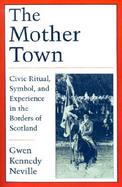The Mother Town Civic Ritual, Symbol, and Experience in the Borders of Scotland
- Binding: Paperback
- Publisher: Oxford Univ Pr on Demand
- Publish date: 04/01/1994
Product notice
Returnable at the third party seller's discretion and may come without consumable supplements like access codes, CD's, or workbooks.
| Seller | Condition | Comments | Price |
|
Ergodebooks
|
Good |
$8.38
|
|
Priceless Books
|
Very Good
|
$8.43
|
|
GridFreed
|
New |
$69.25
|

Please Wait

